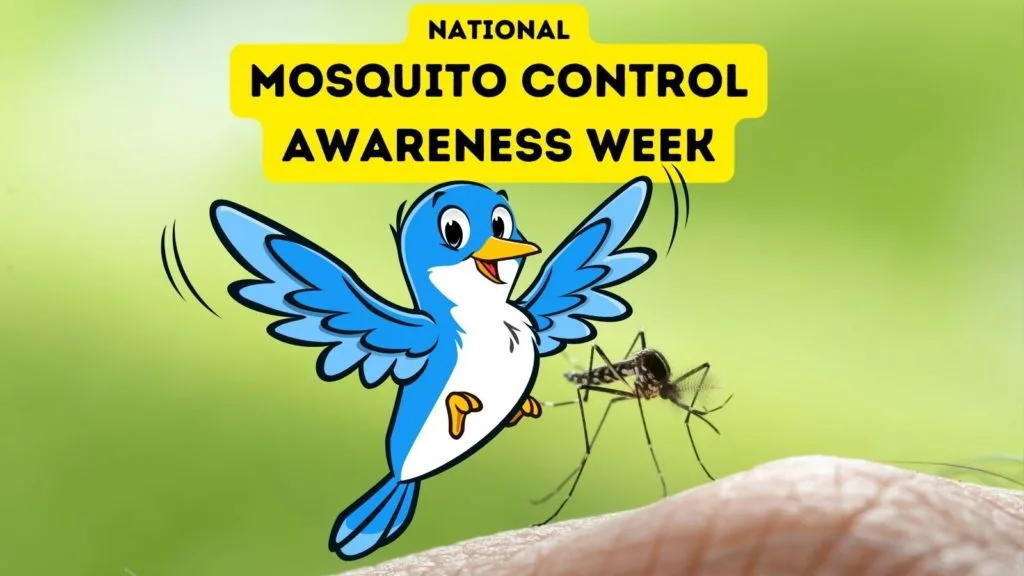National Mosquito Control Awareness Week is an important event that highlights the significance of controlling mosquito populations to prevent diseases and improve public health. A lesser-known aspect of this is the role birds play in natural mosquito control. Birds are vital in maintaining the balance of ecosystems and can help manage mosquito populations.

When is National Mosquito Control Awareness Week?
National Mosquito Control Awareness Week is observed every year in late June. This awareness week was founded by the American Mosquito Control Association.
Birds and Mosquito Control
Various bird species are known to feed on mosquitoes, which helps in naturally controlling these insect populations. While birds alone cannot completely eradicate mosquitoes, their feeding habits can significantly reduce the number of mosquitoes in a given area.
Which Birds Eat Mosquitoes?
Many birds eat the occasional mosquito but these backyard visitors are really known to chow down on the pesky pests!
- Swallows: Known for their agile flying, swallows feed on mosquitoes mid-air.
- Purple Martins: Popularly known for their mosquito-eating habits, though their diet is varied.
- Bats: While not birds, bats are significant nocturnal predators of mosquitoes.
- Sparrows and Warblers: These small birds feed on mosquitoes, among other insects.
- Waterfowl: Birds like ducks and geese feed on mosquito larvae in ponds and lakes, helping control mosquito populations before they become airborne.
Interesting Facts About Birds and Mosquitoes
The presence of bird baths and water features in gardens can attract mosquito-eating birds. You can prevent mosquitoes (as well as algae and diseases) by washing out the bird bath frequently.
Some bird species are known to be carriers of West Nile Virus, a disease transmitted by mosquitoes.
The diet of birds varies greatly with seasons and geographical locations, influencing their impact on mosquito populations.
Installing birdhouses and planting native vegetation can attract insectivorous birds, aiding in mosquito control.
Birds like Chickadees, Nuthatches, and Titmice, while not primary mosquito predators, contribute to controlling overall insect populations.
The reduction of mosquito habitats, such as standing water, is crucial in mosquito control efforts, benefiting both human health and bird populations.
Ornithologists often study bird feeding patterns to understand the dynamics of ecosystems, including insect control.
Some studies suggest that during certain periods, up to 50% of a Purple Martin’s diet can be composed of flying insects, including mosquitoes.
Warblers, often found in wooded areas, consume a significant number of mosquitoes during their foraging.
Owls and nightjars, nocturnal birds, also play a role in controlling nocturnal insect populations, though mosquitoes are a smaller part of their diet.
During nesting season, birds require more protein-rich foods like insects, indirectly impacting mosquito populations.
The global decline in bird populations can have a ripple effect, potentially leading to increases in insect populations, including mosquitoes.
Birds contribute to the control of mosquito-borne diseases not just by eating mosquitoes, but also by maintaining the balance in ecosystems that limits mosquito overpopulation.
Mosquitoes are more attracted to areas with less biodiversity, highlighting the importance of a healthy bird population in maintaining ecological balance.
National Mosquito Control Awareness Week brings to light the crucial role birds and other wildlife play in controlling mosquito populations. Understanding and supporting this natural balance is key to effective mosquito management and ecological health.
More Bird Days
BirdTipper features dozens of bird days and months throughout the year; you might also enjoy these:
National Wild Bird Feeding Month
- Does Bird Seed Expire? - May 11, 2024
- How Big Are Baby Hummingbirds? - May 5, 2024
- How to Prevent Mold in Hummingbird Feeder - May 2, 2024
